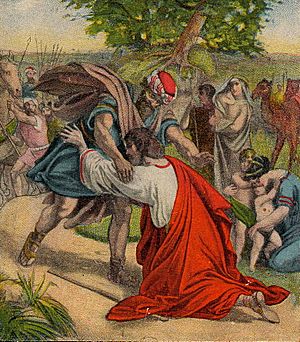Forgiveness facts for kids
Forgiveness is when someone chooses to let go of anger or hurt towards another person. This happens after someone has done something wrong, like an offense or a mistake. Forgiveness is a choice you make on purpose. When you forgive, you stop holding onto bad feelings like wanting revenge. Instead, you wish the other person well.
Contents
What is Forgiveness?
Forgiveness is a way of thinking or a spiritual process. It means you no longer feel angry at someone else, or even at yourself. This can be because of a mistake, an insult, or something that caused harm.
Forgiveness does not mean the person who did wrong has to be punished or pay you back. It is given freely, without expecting anything in return. Sometimes, forgiveness might involve someone saying sorry.
Forgiveness is about how the person who forgives feels. It also affects their relationship with the person they forgive. You can even forgive someone without them knowing about it. For example, you can forgive someone who has passed away or someone you haven't seen in a long time.
True forgiveness means letting go of past wrongs. It is honest and real. It does not make the other person feel ashamed. It is not done out of pride. You can tell if forgiveness is real by what people do, not just by what they say.
Mahatma Gandhi once said, "The weak can never forgive. Forgiveness is the attribute of the strong." This means it takes strength to truly forgive.
Forgiveness in Religions
Many religions around the world teach about forgiveness. These teachings have shaped how people understand and practice forgiveness today.
Judaism
In Judaism, if you hurt someone, you must go to them and ask for forgiveness. If you are truly sorry and try to fix what you did wrong, the person you harmed should forgive you.
"[J]ust as I forgive everyone, so may You grant me grace in the eyes of others, that they too forgive me absolutely." —Tefila Zaka
Every year, Jewish people celebrate Yom Kippur, also called the Day of Atonement. Before Yom Kippur, Jews ask for forgiveness from anyone they have wronged during the year. On Yom Kippur, they fast and pray for God's forgiveness for sins against God. God can only forgive sins against God. That is why it is important to also ask forgiveness from people you have wronged.
Christianity
In Christianity, Jesus taught that it is very important to forgive others and show mercy. The New Testament has many examples of this.
“Blessed are the merciful, for they will be shown mercy.” —Matthew 5:7 (NIV)
“But I tell you who hear me: Love your enemies, do good to those who hate you, bless those who curse you, pray for those who mistreat you. If someone strikes you on one cheek, turn to him the other also.” —Luke 6:27-29 (NIV)
“Be merciful, just as your Father is merciful.” —Luke 6:36 (NIV)
“Do not judge, and you will not be judged. Do not condemn, and you will not be condemned. Forgive, and you will be forgiven.” —Luke 6:37 (NIV)
Jesus told the Parable of the Unforgiving Servant (Matthew 18:21-35) to show that we should forgive without limits. The Parable of the Prodigal Son is another famous story about forgiveness. It shows God's forgiveness for his people.
Islam
Islam teaches that Allah is Al-Ghaffur, meaning "The Oft-Forgiving." Allah is the main source of all forgiveness (ghufran). Asking Allah for forgiveness and truly being sorry is a good quality.
Many verses in the Qur'an and the Hadiths suggest forgiveness.
"Allah forgives what is past." —Qur'an 5:95
Islam encourages believers to forgive each other because Allah values forgiveness. However, Islam also allows for seeking justice, but only to the extent of the harm done.
"The recompense for an injury is an injury equal thereto: but if a person forgives and makes reconciliation, his reward is due from Allah: for Allah loveth not those who do wrong." —Qur'an 42:40
Forgiveness among believers is encouraged, with a promise of a reward from Allah.
Bahá'í Faith
In the Bahá'í Faith, Bahá'í writings explain how to be forgiving towards others.
"Love the creatures for the sake of God and not for themselves. You will never become angry or impatient if you love them for the sake of God. Humanity is not perfect. There are imperfections in every human being, and you will always become unhappy if you look toward the people themselves. But if you look toward God, you will love them and be kind to them, for the world of God is the world of perfection and complete mercy. Therefore, do not look at the shortcomings of anybody; see with the sight of forgiveness." —`Abdu'l-Bahá, The Promulgation of Universal Peace, p. 92
The writings of Shoghi Effendi, a leader of the Bahá'í Faith, say that you should "forgive and forget" what someone has done to you. This way, you will also be forgiven.
Buddhism
In Buddhism, forgiveness helps stop harmful thoughts from hurting a person’s mind. Buddhism teaches that feelings of hatred can have a lasting effect on your karma (the sum of a person's actions). Buddhism encourages thoughts that have a positive effect.
"In contemplating the law of karma, we realize that it is not a matter of seeking revenge but of practicing mettā and forgiveness, for the victimizer is, truly, the most unfortunate of all."
When you feel upset, the Buddhist practice is to calmly let those feelings go. Buddhism focuses on finding freedom from suffering through meditation.
Buddhism also looks at the emotions that make forgiveness necessary.
"If we haven’t forgiven, we keep creating an identity around our pain, and that is what is reborn. That is what suffers."
Buddhism highlights mettā (loving kindness), karuṇā (compassion), mudita (joy), and upekkhā (equanimity). These are ways to avoid feeling upset in the first place. These ideas help us understand suffering in the world, both our own and others'.
Hinduism
Forgiveness is one of the six most important good qualities in Hinduism. A person who does not forgive carries a "baggage" of bad memories and negative feelings. These feelings can affect their present and future. In Hinduism, you must forgive others, and you must also ask for forgiveness if you have wronged someone.
Hindu epics and old literature also talk about forgiveness. For example:
"Forgiveness is virtue; forgiveness is sacrifice; forgiveness is the Vedas; forgiveness is the Shruti; ... forgiveness is holiness; and by forgiveness ... the universe is held together." —Mahabharata, Book 3, Vana Parva, Section XXIX
"Righteousness is the one highest good, forgiveness is the one supreme peace, knowledge is one supreme contentment, and benevolence, one sole happiness." —Mahabharata, Book 5, Udyoga Parva, Section XXXIII
In Hinduism, you seek forgiveness from those you have wronged. You also seek it from society through acts like charity, cleansing rituals, fasting, and meditation. Forgiveness in Hindu thought does not always mean you have to make peace with the person who wronged you. It also does not rule out making up in some situations. Forgiveness in Hindu philosophy means being kind, gentle, and letting go of the harm caused by someone else. Forgiveness is key to freeing yourself from negative thoughts. It helps you focus on living a happy, moral, and ethical life (a dharmic life). In the highest spiritual state, forgiveness becomes a part of who you are. The person who was hurt remains calm, without anger (akrodhi), and does not feel like a victim.
Jainism
In Jainism, forgiveness (or kṣamāpanā) is one of the main good qualities that Jains should have. Forgiveness is part of the ten important qualities of dharma. Jain texts quote Māhavīra on forgiveness:
By practicing prāyaṣcitta (repentance), a soul gets rid of sins, and commits no transgressions; he who correctly practises prāyaṣcitta gains the road and the reward of the road, he wins the reward of good conduct. By begging forgiveness he obtains happiness of mind; thereby he acquires a kind disposition towards all kinds of living beings; by this kind disposition he obtains purity of character and freedom from fear.— Māhavīra in Uttarādhyayana Sūtra 29:17–18
In the Jain prayer pratikramana, Jains often ask for forgiveness from all living things. This includes plants and tiny living things they might have harmed while eating or working.
I ask pardon of all creatures, may all creatures pardon me. May I have friendship with all beings and enmity with none.
In their daily prayers, Jains ask forgiveness from all creatures:
I seek forgiveness from all those living beings which I may have tortured while walking, coming and going, treading on living organism, seeds, green grass, dew drops, ant hills, moss, live water, live earth, spider web and others. I seek forgiveness from all these living beings, be they — one sensed, two sensed, three sensed, four sensed or five sensed. Which I may have kicked, covered with dust, rubbed with ground, collided with other, turned upside down, tormented, frightened, shifted from one place to another or killed and deprived them of their lives. (By confessing) may I be absolved of all these sins.
Jains ask for forgiveness by saying, Micchāmi dukkaḍaṃ. This phrase means, "May all the evil that has been done be fruitless." On samvatsari, Jains greet their friends and family saying micchāmi dukkaḍaṃ and asking for their forgiveness. They send letters and make phone calls to ask for forgiveness. After samvatsari, there are no arguments or disagreements.
Related topics
Images for kids
-
Emperor Marcus Aurelius shows mercy to his defeated enemies (Capitoline Museum in Rome)
-
Holi is the Hindu festival of colors, celebrated in spring. It is a day to forgive, meet others, and fix relationships. In Indonesia, among Balinese Hindus, Ngembak Geni – the day after Nyepi – is a festive spring day to meet, ask for, and give forgiveness.
See also
 In Spanish: Perdón para niños
In Spanish: Perdón para niños







